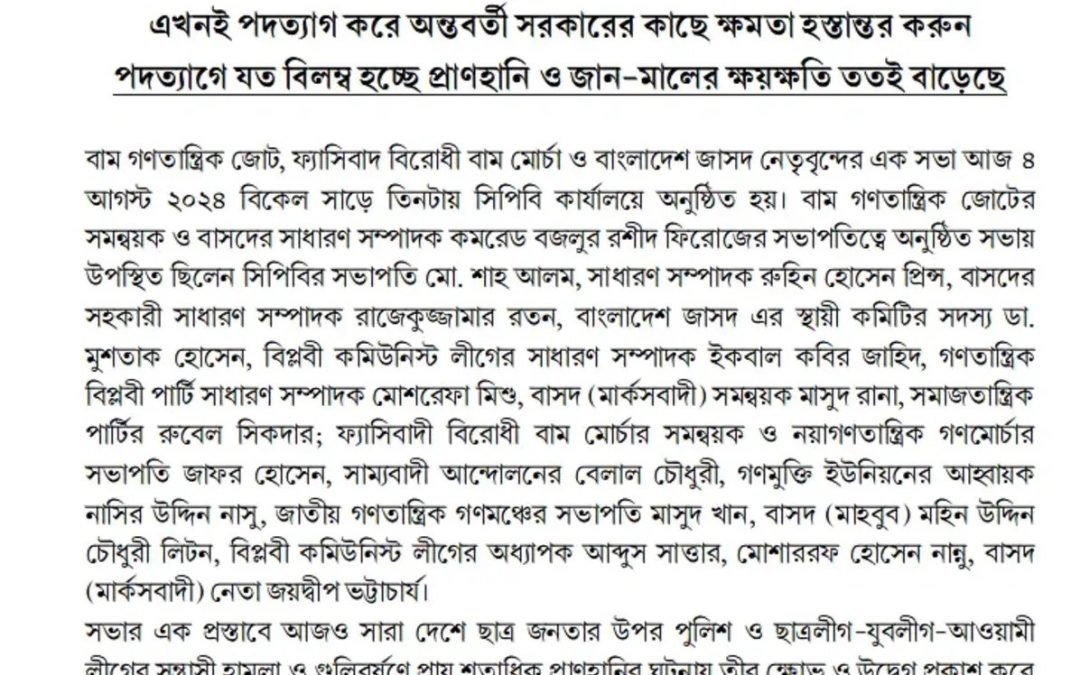Post from Left Democratic Alliance
Bangladesh, a country with a rich history and strong people, is facing one of its toughest challenges.
Political turmoil and violence are putting lives and livelihoods in danger.
People across the nation are calling for change, demanding justice, peace, and fairness.
This article looks at the critical situation of August 4, 2024, and explores the urgent need for collective action to ensure a brighter future.
The Dangers of Political Deadlock
The political crisis in Bangladesh has reached a critical stage.
Leaders from groups like the Left Democratic Alliance, the Anti-Fascist Left Front, and the Bangladesh JSD have warned that if the current government does not step down, the loss of lives and property will only increase.
They are urging Prime Minister Sheikh Hasina’s administration to resign and transfer power to an interim government.
The delay in addressing these issues is worsening the situation.
Police forces and ruling party groups, including the Chhatra League, Juba League, and Awami League, have been accused of attacking students and civilians.
These incidents show how close the nation is to falling into civil war.
The leaders believe immediate action is needed to prevent further harm.
Stopping the Violence
Violence has turned the streets of Bangladesh into dangerous places.
At a meeting held at the CPB office in Dhaka, leaders of the opposition spoke out against the ongoing bloodshed.
They called on the government to listen to the demands of the anti-discrimination student movement.
The continuous violence, which some have described as a “bloody Holi,” must come to an end.
The opposition’s message is clear: the government needs to step aside to stop the chaos.
By refusing to engage with the movement’s demands, the government is only deepening the division in the country.
This movement, which began with students, now resonates with workers, farmers, and other ordinary citizens who seek fairness and justice.
Coming Together for Change
Bangladesh’s greatest strength is its people, who are uniting across different backgrounds to demand change.
At Sunday’s meeting, leaders called on everyone to join the movement, including farmers, students, workers, and women.
Bazlur Rashid, the coordinator of Bam Ganatantrik Jote, along with Shah Alam, CPB president, and Ruhin Hossain (Prince), CPB general secretary, led these calls for unity.
The goal is a massive non-cooperation movement to pressure the government into stepping down.
Leaders like Mushtaq Hossain of Bangladesh JSD, Iqbal Kabir of the Revolutionary Communist League, and Mosherefa Mishu of the Democratic Revolutionary Party echoed the call for collective action.
This movement is not just political; it represents the fight for the future of the nation.
Moving Toward a Better Future
Despite the current chaos, there is still hope. Leaders from leftist and democratic groups are pushing for a peaceful transition of power.
They want an interim government that can stabilize the country and prepare for fair elections.
The courage of students, workers, and ordinary citizens fuels this hope and shows the strength of the Bangladeshi spirit.
The government has a choice: listen to the people’s demands or risk further instability.
This decision will shape the nation’s future and affect the lives of millions.
It is a critical moment for Bangladesh to choose the path of peace and justice.
Verdict
The country of Bangladesh has arrived at a critical juncture in its history.
The voices of its people are growing louder, calling for change and unity.
Every protest and every act of solidarity adds strength to this movement for a better future.
To those in power, the message is simple: act now, or risk losing everything.
As the world watches, Bangladesh has the chance to write a new chapter—one defined by peace, unity, and hope.

